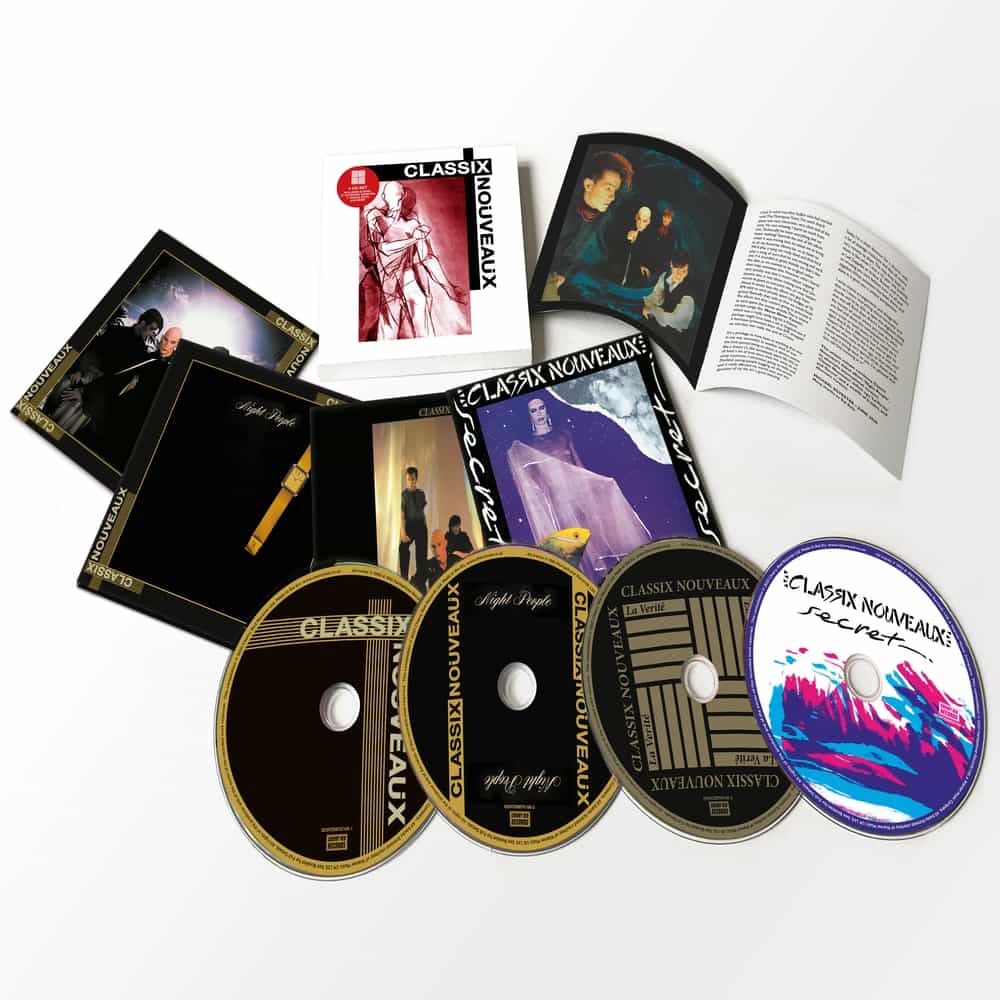A strange one this, starting out in 1976 close to the birthing of the punk scene, musicians Jak Airport (guitars) and Paul ‘B.P.’ Hurding (drums) combined their verve with the creative energy of singer-songwriter Poly Styrene, to create the band X-Ray Spex. Artists whose songs, the likes of ‘Oh Bondage Up Yours!’ and ‘Germfree Adolescents’ would become part of the very fabric of punk and still stand tall today. In 1979, following the band’s break-up, Styrene was replaced by fellow singer-songwriter Sal Solo, radically changing the musical style for this new venture, from punk to new wave and with their 3 albums, they would leave a similar legacy on this scene. With a line-up of Sal Solo on vocals, Jak Airport, guitars, B.P. Hurding, drums, they were joined by Mik Sweeney on bass and keyboards to complete the line-up. Mention their name and the single that comes to mind would have to be ‘Is It A Dream’, but this was a song that didn’t make it to release until March of 1982; before that, this the band were building their exposure, with their debut album Night People released in May 1981.
This is where we start and with Cherry Red releasing a four CD set – The Liberty Recordings 1981-1983, comprising the band’s 3 albums, this looks to be an interesting menu. The twist comes, that their first album is served in 2 forms, its regular UK issue Night People, preceded by its international version Classix Nouveau, along with a host of bonus content on each of these discs. I think I’ll start with the UK version of this, on which February 81’s single ‘Guilty’ proceeds the instrumental track ‘Foreward’. Interestingly this second track is a minute 23 seconds longer on the UK release. The international version seems far more straightforward. Whereas the UK version has a 30 second intro before the vocal takes hold, along with a slightly increased tempo. The number seems to take influence from Roxy Music’s ‘Dance Away’, with its use of synthesiser, although the inclusion of Airport’s guitar lends a definite new wave tendency to the number. Next-up the differing versions of the album are made clear, as the international version includes the single first released in November of 1980. ‘Nasty Little Green Men’ was to make little impact, commercially, although I can’t understand why this wasn’t included on Night People. ‘Run Away’ follows on the UK variant, which is heard earlier than on its sibling. It features an incredibly familiar bass-line, although that could be the way in which Sweeney is playing. I’m hearing an extremely similar tone to that played by Mick Karn on Japan’s 1981 fourth album ‘Gentlemen Take Polaroids’ and was a style of bass guitar that he made his own. This is where the similarity ends, as this most certainly was music born out of the punk-rock/glam scene, with Solo’s vocals adding an angry passion to the number. When it comes to the chorus “…you could never run away from, me…”, I’m sensing a certain air of The Rocky Horror Picture Show and this is possibly where I’m picking up the glam influence. Solo’s presentation is very cinematic, as ‘No Sympathy, No Violins’ enters the offering and like Nosferatu in a black and white movie, his stage is set, “…Don’t talk to me, I will talk to the wall. Men such as we have no feelings at all. So you assume, when we step from the crowd. Death to the voice that objects aloud, we stand up proud…”, gothic presence and majesty is the scene. I’m almost hearing Ultravox’s ‘Vienna‘ from within the composition, along with more Karn like bass. This is something that is becoming less Karn and more Sweeney, as in the number ‘Inside Outside’ that follows, sets a rhythm that rides at an increasing pace. The next number ‘623’ is a mere second longer on Night People than its international version, and includes interplay between bassline and keyboard, in an instrumental of 2 and a half minutes. Then science fiction is introduced in ‘Every Home Should Have One’. I’m hearing this essence in the tone of the song “…I’ve found soothing in my phone, every home should have one. Micro camera, micro phone, every home should have one…” these items were aspirational at this time and their being included in a song was perhaps the nearest some of us would come! So when ‘Tokyo’ is brought to the recording, a Japanese import was another aspirational item that I’d have to wait a number of years before owning, but Solo would sing “…Tokyo is so far away…” bringing this fact home, even the TV I watched had only just turned colour, whereas in Japan they were on their second or third generation. All this was played out in vibrant tones, by way of the sythesiser. The underlying musical quality of this number could’ve been an import from Japan; its lively hi-hat, cheeky synthesiser and deep rumbling bass was just the ticket. ‘Or A Movie’ was another example of Roxy Music inspiring a composition, of that I have no doubt. From the bass harmonies, to the clock ticking, only Solo’s vocal sets it apart from here, until the segue is introduced and you’re clear of the palette this comes from. The next number ‘Soldier’ introduces another equation, although rather than CN being influenced they become the influencer.
Shades of Gene’s Martin Rossiter is what I’m hearing here, as Solo tells the story of the broken soldier. The telling goes “…On both sides we’re fighting, over time and there is no escape, we’ll make that way. Social grace hides jealousy and hate, of what we may achieve or believe in our brains. Sometimes it makes me feel like dying, dying, because dead mean don’t care. [Soldier, soldier] You don’t have to choose to win or lose, it’s the same [Soldier, soldier] Everywhere I turn no one will learn it’s a game…”, an impassioned telling from the battlefield. At least this is what we’re led to assume, but could this be a representation of life. ‘The Protector Of Night’, the final track, hears Classix Nouveaux a possible influence on Sisters Of Mercy‘s Andrew Eldrietch, the gothic tones come screaming from this one. Solo could be channeling First and Last and Always, if it weren’t that Night People was recorded some 4 years earlier. I love the composition of this number, its pace and majesty, the configuration of Hurding’s drums, and Sweeney’s keyboards, is a fitting close to their debut album. If that’s not enough and it was 40 years ago, these expanded issues include a raft of extra tracks and in this case are different on both the international and UK releases. An extended version of ‘Inside Outside’ on Night People along with the 7″ version, with B-sides ‘We Don’t Bite (Come A Little Closer)’ complete with glam pretences, along with ‘Old World For Sale’, a possible tale of what the decade was to launch, or certainly an episode from film director John Carpenter‘s work. These tracks are at least 40 years old, although don’t sound outdated and still sit well today. The international version has further content, with an additional 3 tracks, a new version of ‘The Robots Dance’, along with B-sides ‘Night People’ and a number that speaks of its time ‘Test Tube Babies’, somewhat fitting with ‘fake news’ being the catch-phrase of the moment, as Solo sings “You’ve read about them in your daily papers, you’ve heard the talk about it on TV, you tell yourself you know it’s just a story, but it’s true… We will be…test tube babies [repeated]…”. This brings a smile to my face as I think of someone recently, who should’ve learnt this lesson.
None of these were April fools, but April 1982 saw the release of their most popular album and one that came bearing their biggest hits. With the record buying public now accustomed to their look and sound, the second track on the album was ‘Is It A Dream’ and was one that brought that recognisable searing keyboard riff, as Solo’s vocal barks these words, “…satisfaction, no distraction, no more fighting, no back biting…”, with the song’s name sung as each statement falls fallow. This is a number the band have raised as their standard and will forever be remembered as such. This high energy momentum is reduced as third track ‘To Believe’ is introduced and with synthesisers creating the fabric of this number, does feature a far less memorable pattern all round, becoming what might called an album track. Electronic beats and repetitive tones playing this tune out until ‘Because You’re Young’ is served and C.N. seem to have come back kicking and screaming, as keyboards reminiscent of a horror flick strike up. The memorable hook leads into the chorus “…Because you’re young there’s advice from everyone. Although it brings chains to wings of you and me…”, a familiar story, but with Solo’s impassioned narration and the band displaying their usual fervour. It seems that electronic drum-pads had been a new addition to the recording studio, as perhaps their over use is easy to hear throughout this number. ‘Six To Eight’ follows and is what might be termed a ditty, but this is soon over as the album’s title track ‘La Verité’ chimes in. Solo’s familiar grandeur hits his audience as a number that would be more common in the theatre strikes a pose, with a guitar addition from Jak Airport that may more reminiscent of Queen‘s Brian May. When ‘Never Again (The Days That Time Erased)’ is brought in, it’s easy to draw comparisons of these with Ultravox, artists playing to a similar stage. Both bands were active around the same time and although C.N. didn’t achieve the same success, both were obviously born of the same air, at a time when music would go on to become the foundations of New Romantic. The next number would come as something of a shock, as when ‘It’s All Over’ comes in, a soulful swing is heard, with the same exuberant use of electronic drum pads. We’re about to be reminded that it wasn’t just Prince who discovered the year ‘1999’, but around the same time Solo wrote their version. I can’t honestly say that I’m surprised this didn’t achieve the same accolade as the version written by the diminutive one, but I do hear the line between these and Ultravox is getting slimmer. More theatrics greet the ear on the penultimate song ‘I Will Return’. A number which with its pace and lyrical content, I hear Solo crying his heart out over a relationship playing the endgame, “…I can see a million things I should have done, how can I regret a single one…” with majestical drumming this leads into a segue “…it could have been right, time passes by, those who remain wondering why, they’re the ones who’re left behind…”, as the band make their bid for the West End, this really should’ve been turned into a stage play, the theatrics are already present. As the final number ‘Finale’ is brought in, it becomes clear that this album was like a canvas. This particular version has a further 11 tracks of bonus content left, from 2 versions of ‘Never Again’, in both short and long forms, that are separated by the instrumental ‘627’. 7″ and 12″ versions of the tracks ‘Is It A Dream’ and ‘Because You’re Young’, are included, along with the B-side ‘Where To Go’.
November 1983 saw the release of their 3rd and final album Secret and this is where we conclude our review. ‘All Around The World’ opened the album, capturing the zeitgeist of its day, sitting extremely well with what the 80s was to bring. The sound was full, big shoulder pads, even bigger hair (Solo obviously sat this one out) and the bright neon colours that the music projected. Electronic backing was used in the composition, with guitar solos that Steve Vai might be found executing. ‘Manitou’ was next up and I’m hearing Harold Faltermeyer in the tones used, although Solo’s strangulated vocal is one that reminds me of Bauhaus’s Peter Murphy, although the musical sunshine that comes from this number is nothing but radiant. The staging is superb, it’s all there, from deep drum rolls to a staircase constructed from the synth used. Is it a saxophone or an electronic representation played on the synthesiser that is heard. It doesn’t matter, as the number has already won my heart, gothic tendencies from within an Ibiza nightclub. ‘Heart From The Start’ follows, but this is too Euro-pop for me. Its shrill keyboard tones marking its territory, “…heart from the start, far apart, separated or faded…” shrieks of Eurovision. When it comes to ‘The Fire Inside’, it does come across as a different prospect, although possessing an intro I’m certain that after an E, early Prodigy took their influence. From the opening electronic loops, the drum patterns speak of something a little different, chants from a Soviet Gulag with Solo’s lyrics sung over the top. Halfway through the album and it is clear that CN had evolved, from the post punk glam sounds that were present on their debut Night People whose name might suggest a gothic leaning, to the sounds heard on this album, which are of a more polished hue. Synthesisers used are naturally executed with greater panache, although sometimes can lend a plastic quality to the numbers, with perhaps a little too much given to any song. I found ‘Forever And A Day’ at the halfway point to be one number that could’ve benefitted from being stripped down. Less strings certainly, rather than these being what held the song. No such excess was the case on ‘The Unloved’, which benefits from exploring the Indian genre in the production of the song. This Anglo-Asian pop was an avenue synth-duo Blancmange were to explore on their 1984 album Mange Tout, with elements you may find on early Depeche Mode. This is something that musically you might find reflected on the closing track here, ‘No Other Way’, although this could be down to the electronics used around this time. Like the other album content, following this original recording you will find it also features a swathe of mixes, instrumentals and B-sides. Of particular note are ‘Switch’, a synth heavily instrumental, a full length version which clocks in at 6’46”, as well as the regular 3’57” version. In addition ‘Manitou’, makes a further appearance, with both extended and instrumental versions.
Although never quite achieving the same success of their contemporaries, Classix Nouveax were to achieve cult status and certainly earned their place in music’s history. The band split in 1985, with Solo releasing albums of specifically Christian content. His first in 1985 Heart And Soul featured the track ‘San Damiano‘ which reached number 15 in the UK and No.1 in Poland. This has since been recorded by several artists, including Aled Jones on his 2003 album Higher. Leaving these shores in 1999 for the USA, he can now be found addressing audiences, speaking at large events, conferences and retreats. No longer performing concerts, Sal is busy mentoring, producing and managing young up and coming artists.




